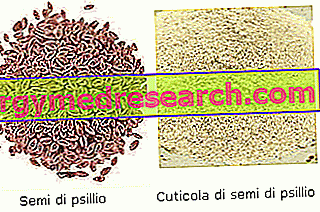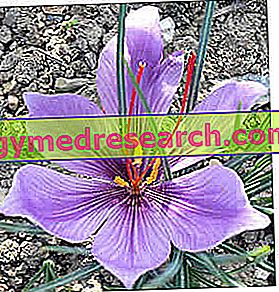The product commonly sold in herbalist's shops under the name of psyllium is made up of the seeds or cuticle of Plantago psyllium (= Plantago arenaria, Plantago indica ), an annual herbaceous plant grown mainly in Iran, India, Pakistan and the United States of America.
Health benefits
The mucilages are polysaccharides of complex chemical composition, belonging to the categories of soluble fibers and endowed with emollient, protective, anti-inflammatory, laxative-constipating effect.
The main characteristic of psyllium seeds is linked precisely to the mucilaginous coating that covers them, which expands in contact with water and increases its weight by 25 times. The most well-known effect of psyllium, the laxative one, therefore depends on its ability to recall liquids in the lumen of the intestine, swelling, increasing the intestinal contents and consequently stimulating peristalsis and evacuation. This effect, called "bulk forming", is typical of laxatives that increase and soften the fecal mass (called "mechanical"), particularly appreciated for their safety and effectiveness. Like all laxatives belonging to this category, to obtain the desired effect, psyllium seeds must also be taken together with abundant liquids and used in the right quantities.

The ability of psyllium to recall fluids in the intestinal lumen and swell, is useful not only in case of constipation, but also in the presence of diarrhea. In the latter case it acts by absorbing excess fluid and increasing the consistency of the fecal bole (also called kilo).
Because of this normalizing effect on intestinal transit and on the consistency of the faeces, psyllium has also proved useful in colitis and in cases of irritable and diverticulosis; its lubricating effect, linked to the ability to increase the softness of the stools, makes it useful also in the presence of hemorrhoids and anal fissures.
For all these reasons psyllium is a common ingredient of some breakfast cereals, but also an important component of food supplements and widely used drugs, such as normalizing intestinal functions or as laxatives.
Intake doses
Currently it is believed that a daily consumption of 5-7 grams of psyllium seeds is useful for normalizing intestinal functions and for preventing cardiovascular disorders (by accelerating intestinal transit they reduce the absorption of cholesterol, harmful substances and slow down that of simple sugars it follows a normalizing effect on glycemic values and LDL cholesterol). The intake of psyllium must be accompanied with an adequate amount of water (150-200 ml every 5 grams).
At the same weight, the effects are clearly superior for psillio mucilaginous extracts compared to whole seeds, since the mucilages concentrate in the cuticle ("external tegument"). In these cases an intake of 2 grams / day is sufficient.
Watch the video
X Watch the video on youtubeSide effects
If used for a long time and in doses higher than the recommended ones, psyllium can cause flatulence and a feeling of abdominal bloating. Mass laxatives should not be used in the presence of oesophageal or gastrointestinal strictures, ie in those cases where constipation is due to mechanical obstruction (cancer, inflammation and chronic ischemia, endometriosis, hernias, ovarian or uterine neoplasms ). Caution in the presence of toxic megacolon, due to its ability to alter colon motility. It is also advisable to avoid taking psyllium just before bedtime, to prevent it from obstructing the esophagus; caution in allergy sufferers and in those subjected to cholesterol-lowering and hypoglycemic therapy (psyllium seeds enhance the effect of these drugs).



